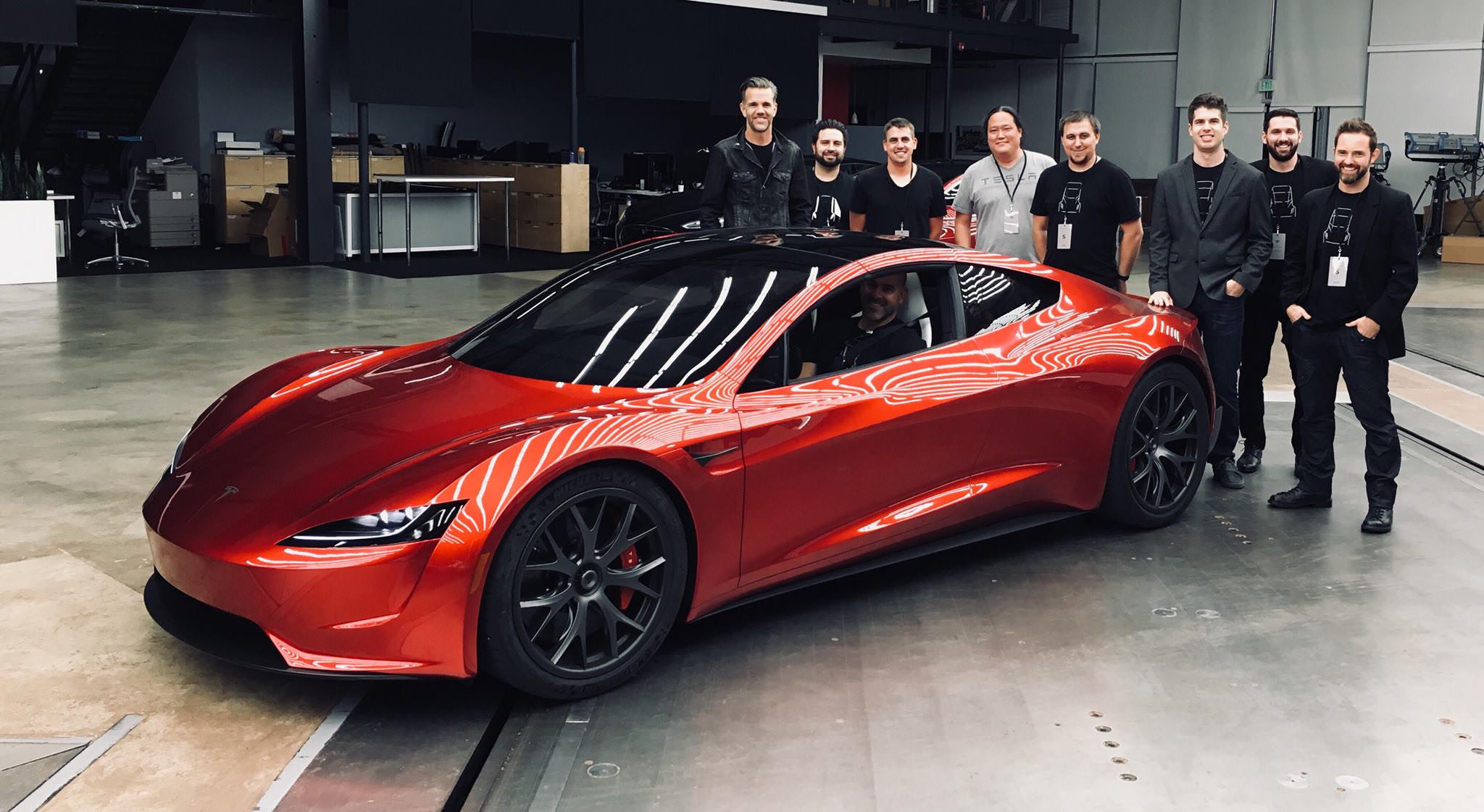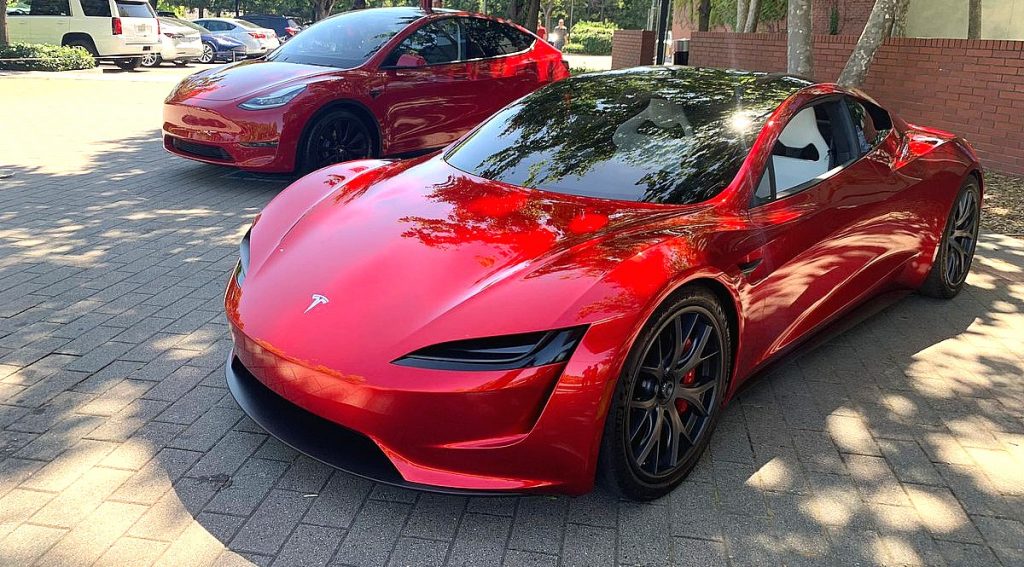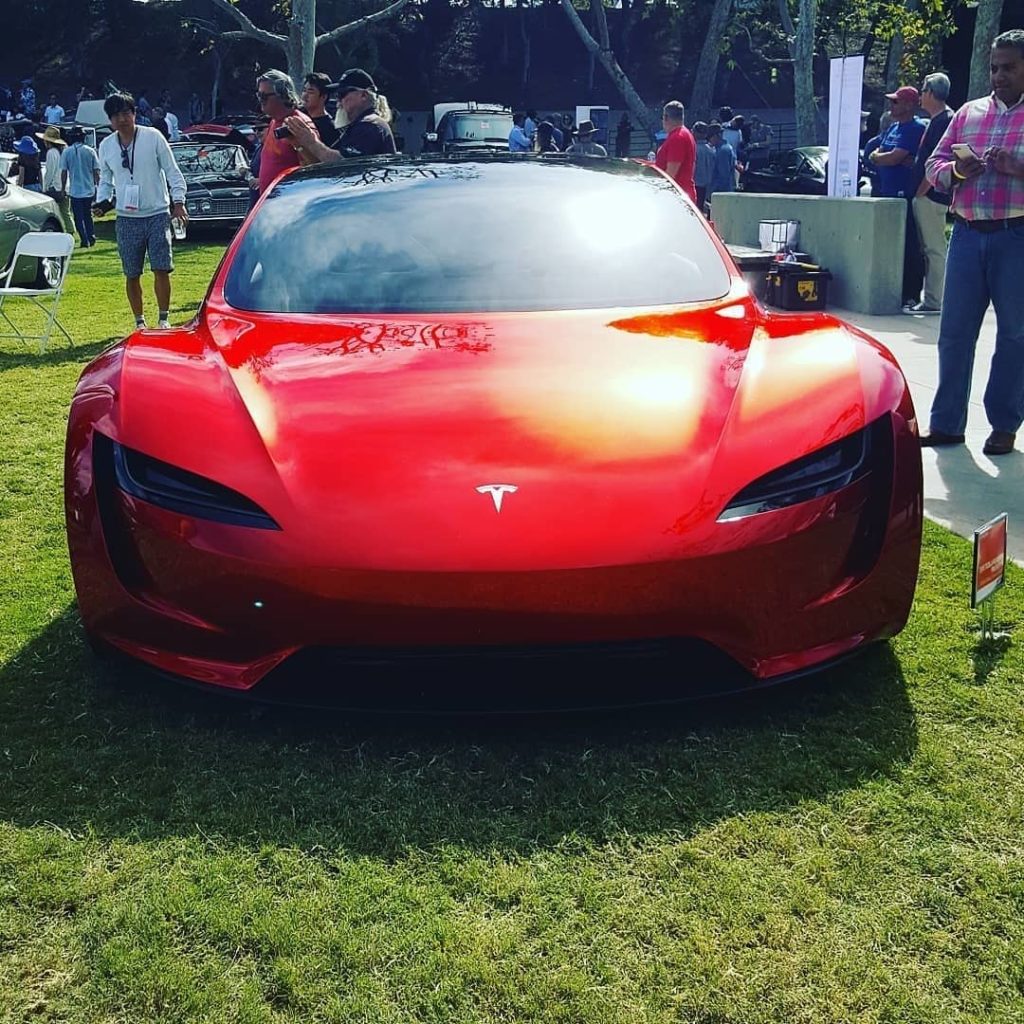

News
Tesla Roadster production car will exceed insane prototype ‘in every way:’ Chief of Design
Tesla Chief Designer Franz von Holzhausen recently made a rare appearance at owner-enthusiast Ryan McCaffrey’s Ride the Lightning podcast, where he provided several key insights into the electric car maker’s design process from the early days of the Model S to the upcoming next-generation Roadster.
While speaking about Tesla’s “halo” vehicle, von Holzhausen mentioned that the all-electric supercar has been in a process of evolution since it was unveiled. The designer added that these changes will make the production vehicle even more impressive than the already-insane prototype that came out of the Tesla Semi’s trailer nearly two years ago.
“It’s evolving deservedly so; it needs more time. It will be even better than what we’ve unveiled. In every way,” Franz said.
Considering the specs of the next-generation Tesla Roadster that were announced during its unveiling, Franz’s statements are very exciting. The initial specs of the next-gen Roadster, after all, are already bordering on insane, with its 0-60 mph time of 1.9 seconds, its top speed of over 250 mph, and its range of 620 miles per charge due to its 200 kWh battery.

These specs already place the next-gen Roadster head and shoulders above the competition, while putting the vehicle well into the performance of the auto industry’s most esteemed hypercars. Thus, it is quite difficult to wrap one’s head around the idea that the production version of the all-electric car will be a more extreme vehicle.
For Franz, the Roadster is ultimately a passion project. Describing the moment he drove out of the Tesla Semi’s trailer as a “One More Thing” surprise during the all-electric long-hauler’s unveiling event, Franz stated that the experience was memorable, partly due to how impressive the vehicle was.
“It’s an amazing machine. That car is like no other. I think it showcases the ability of what an electric vehicle can be… Being able to finally show people that — that was a cool moment,” he said.
Inasmuch as the idea of a more extreme next-generation Roadster might seem ludicrous (or is it Plaid?), Tesla actually has a reputation for doing the very same thing. The Model 3, for example, was initially announced to have a 0-60 mph time of “less than 6 seconds” during its unveiling event. Even the vehicle’s “slowest” trim, the Standard Range variant that’s available off-menu, has a 0-60 mph time of 5.6 seconds. That’s a hair faster than the BMW 730d M-Sport.

Franz’s recent comments echo those of CEO Elon Musk’s when he discussed the Roadster in his guest appearance at the Ride the Lightning podcast a few months ago. While speaking about the vehicle then, Musk stated that the next-gen Roadster will reach a level of performance that is almost unfair to gasoline or diesel-powered cars.
“We’re going to do things with the new Roadster that are kind of unfair to other cars. (It’s) crushingly good relative to the next best gasoline sports car,” Musk said.
Tesla CEO Elon Musk has stated that the next-generation Tesla Roadster will only see a production of about 10,000 units per year. That’s far above the output of niche all-electric hypercar makers such as Rimac, but it’s still very low compared to the annual production of the Model S, X, and Model 3. With this in mind, and with a $200,000 starting price that is on the same ballpark as a moderately-equipped Porsche Taycan Turbo S, there is a pretty good chance that Tesla’s “hardcore smackdown to gasoline-powered cars” will see great demand well into its release.
Ryan McCaffrey’s interview with Tesla Chief Designer Franz von Holzhausen at the Ride the Lightning podcast could be accessed here.
News
Tesla begins Robotaxi certification push in Arizona: report
Tesla seems serious about expanding its Robotaxi service to several states in the coming months.

Tesla has initiated discussions with Arizona transportation regulators to certify its driverless Robotaxi service in the state, as per a recent report from Bloomberg News. The move follows Tesla’s launch of its Robotaxi pilot program in Austin, Texas, as well as CEO Elon Musk’s recent comments about the service’s expansion in the Bay Area.
The Arizona Department of Transportation confirmed to Bloomberg that Tesla has reached out to begin the certification process for autonomous ride-sharing operations in the state. While details remain limited, the outreach suggests that Tesla is serious about expanding its driverless Robotaxi service to several territories in the coming months.
The Arizona development comes as Tesla prepares to expand its service area in Austin this weekend, as per CEO Elon Musk in a post on X. Musk also stated that Tesla is targeting the San Francisco Bay Area as its next major market, with a potential launch “in a month or two,” pending regulatory approvals.
Tesla first launched its autonomous ride-hailing program on June 22 in Austin with a small fleet of Model Y vehicles, accompanied by a Tesla employee in the passenger seat to monitor safety. While still classified as a test, Musk has said the program will expand to about 1,000 vehicles in the coming months. Tesla will later upgrade its Robotaxi fleet with the Cyercab, a two-seater that is designed without a steering wheel.
Sightings of Cybercab castings around the Giga Texas complex suggests that Tesla may be ramping the initial trial production of the self-driving two-seater. Tesla, for its part, has noted in the past that volume production of the Cybercab is expected to start sometime next year.
In California, Tesla has already applied for a transportation charter-party carrier permit from the state’s Public Utilities Commission. The company is reportedly taking a phased approach to operating in California, with the Robotaxi service starting with pre-arranged rides for employees in vehicles with safety drivers.
News
Tesla sets November 6 date for 2025 Annual Shareholder Meeting
The automaker announced the date on Thursday in a Form 8-K.

Tesla has scheduled its 2025 annual shareholder meeting for November 6, addressing investor concerns that the company was nearing a legal deadline to hold the event.
The automaker announced the date on Thursday in a Form 8-K submitted to the United States Securities and Exchange Commission (SEC). The company also listed a new proposal submission deadline of July 31 for items to be included in the proxy statement.
Tesla’s announcement followed calls from a group of 27 shareholders, including the leaders of large public pension funds, which urged Tesla’s board to formally set the meeting date, as noted in a report from The Wall Street Journal.
The group noted that under Texas law, where Tesla is now incorporated, companies must hold annual meetings within 13 months of the last one if requested by shareholders. Tesla’s previous annual shareholder meeting was held on June 13, 2024, which placed the July 13 deadline in focus.
Tesla originally stated in its 2024 annual report that it would file its proxy statement by the end of April. However, an amended filing on April 30 indicated that the Board of Directors had not yet finalized a meeting date, at least at the time.
The April filing also confirmed that Tesla’s board had formed a special committee to evaluate certain matters related to CEO Elon Musk’s compensation plan. Musk’s CEO performance award remains at the center of a lengthy legal dispute in Delaware, Tesla’s former state of incorporation.
Due to the aftermath of Musk’s legal dispute about his compensation plan in Delaware, he has not been paid for his work at Tesla for several years. Musk, for his part, has noted that he is more concerned about his voting stake in Tesla than his actual salary.
At last year’s annual meeting, TSLA shareholders voted to reapprove Elon Musk’s compensation plan and ratified Tesla’s decision to relocate its legal domicile from Delaware to Texas.
Elon Musk
Grok coming to Tesla vehicles next week “at the latest:” Elon Musk
Grok’s rollout to Tesla vehicles is expected to begin next week at the latest.

Elon Musk announced on Thursday that Grok, the large language model developed by his startup xAI, will soon be available in Tesla vehicles. Grok’s rollout to Tesla vehicles is expected to begin next week at the latest, further deepening the ties between the two Elon Musk-led companies.
Tesla–xAI synergy
Musk confirmed the news on X shortly after livestreaming the release of Grok 4, xAI’s latest large language model. “Grok is coming to Tesla vehicles very soon. Next week at the latest,” Musk wrote in a post on social media platform X.
During the livestream, Musk and several members of the xAI team highlighted several upgrades to Grok 4’s voice capabilities and performance metrics, positioning the LLM as competitive with top-tier models from OpenAI and Google.
The in-vehicle integration of Grok marks a new chapter in Tesla’s AI development. While Tesla has long relied on in-house systems for autonomous driving and energy optimization, Grok’s integration would introduce conversational AI directly into its vehicles’ user experience. This integration could potentially improve customer interaction inside Tesla vehicles.
xAI and Tesla’s collaborative footprint
Grok’s upcoming rollout to Tesla vehicles adds to a growing business relationship between Tesla and xAI. Earlier this year, Tesla disclosed that it generated $198.3 million in revenue from commercial, consulting, and support agreements with xAI, as noted in a report from Bloomberg News. A large portion of that amount, however, came from the sale of Megapack energy storage systems to the artificial intelligence startup.
In July 2023, Musk polled X users about whether Tesla should invest $5 billion in xAI. While no formal investment has been made so far, 68% of poll participants voted yes, and Musk has since stated that the idea would be discussed with Tesla’s board.
-

 Elon Musk1 week ago
Elon Musk1 week agoTesla investors will be shocked by Jim Cramer’s latest assessment
-

 Elon Musk3 days ago
Elon Musk3 days agoElon Musk confirms Grok 4 launch on July 9 with livestream event
-

 Elon Musk17 hours ago
Elon Musk17 hours agoxAI launches Grok 4 with new $300/month SuperGrok Heavy subscription
-

 News7 days ago
News7 days agoTesla Model 3 ranks as the safest new car in Europe for 2025, per Euro NCAP tests
-

 Elon Musk2 weeks ago
Elon Musk2 weeks agoA Tesla just delivered itself to a customer autonomously, Elon Musk confirms
-

 Elon Musk1 week ago
Elon Musk1 week agoxAI’s Memphis data center receives air permit despite community criticism
-

 Elon Musk2 weeks ago
Elon Musk2 weeks agoTesla’s Omead Afshar, known as Elon Musk’s right-hand man, leaves company: reports
-

 News2 weeks ago
News2 weeks agoXiaomi CEO congratulates Tesla on first FSD delivery: “We have to continue learning!”














